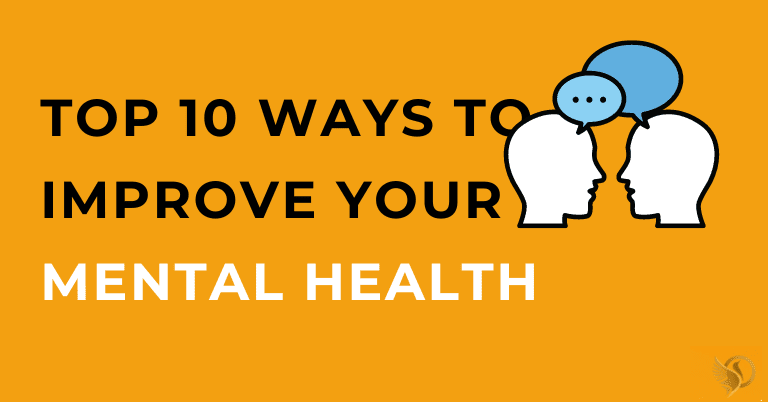We can find that in recent times there has been the importance of mental health. Mental health refers to emotional, psychological and social awareness and further adds to how we think, feel, and behave. Good mental health is essential for overall health and well-being, and it is important to take steps to maintain and improve our mental health.
We are going to discuss the top 10 ways to improve your mental health. Before that, let’s just clear some of our basic thoughts regarding mental health.
How important is mental health?
Mental health is incredibly important, as it affects our overall well-being and quality of life. Good mental health allows us to enjoy our relationships, pursue our goals, and cope with life’s challenges in a healthy and effective way. Otherwise poor mental health lead to a range of negative outcomes, such as difficulty functioning at work or school, relationship problems, physical health problems, and even suicide.
Mental health is also closely linked to physical health, as poor mental health can lead to a range of physical health problems, such as cardiovascular disease, diabetes, and obesity. Conversely, good mental health can improve physical health outcomes and increase life expectancy.
What are the benefits of having good mental health?
Improved relationships: Good mental health allows us to build and maintain positive relationships with others. When we feel mentally well, we are better able to communicate effectively, resolve conflicts, and enjoy meaningful connections with others.
Increased resilience: Good mental health enables us to cope effectively with stress, adversity, and life’s challenges. When we have strong mental health, we are better equipped to bounce back from setbacks and handle difficult situations with grace and resilience.
Better physical health: Good mental health is closely linked to physical health, as it can reduce the risk of chronic illnesses such as cardiovascular disease, diabetes, and obesity. Mental well-being also promotes healthy behaviors such as regular exercise, good nutrition, and adequate sleep.
Enhanced creativity and productivity: Good mental health can stimulate creativity and productivity, allowing us to achieve our goals and fulfill our potential. When we are mentally well, we are more motivated, focused, and productive.
Improved quality of life: Ultimately, good mental health leads to a better quality of life. It enables us to enjoy the present moment, pursue our goals and interests, and experience a greater sense of happiness, meaning, and fulfillment.
In summary, good mental health has numerous benefits that can improve our lives in many ways, from better relationships and increased resilience to improved physical health and greater productivity.
1. Exercise regularly
Exercise is not only good for physical health but also for mental health. Regular exercise can reduce symptoms of anxiety and depression, improve mood and self-esteem, and increase resilience to stress. To incorporate exercise into your routine, you can start small by taking a walk every day or doing a short workout at home. You can slowly increase the intensity and duration of your exercise as you build up your fitness level.
2. Practice mindfulness and meditation
Practicing mindfulness and meditation is an art in itself. It involves concentrating on the present moment without judgment or creating any thought. They have been shown to reduce symptoms of anxiety and depression, improve attention and focus, and increase feelings of calm and well-being. To practice mindfulness and meditation, you can start by sitting in an open space or a clean environment and taking a few minutes each day and sitting quietly, then focusing on your breath. You can also use guided meditations or mindfulness apps to help you get started.
3. Get enough sleep
Sleep is essential for mental health. This is scientifically proven that lack of sleep can lead to irritability, mood swings, and difficulty concentrating. To improve sleep quality, you can establish a regular sleep routine, avoid caffeine and Alcohol before bedtime, and create a comfortable sleep environment.
4. Eat a healthy diet
What we eat can affect our mental health. A healthy diet that includes a lot of fruits, veggies, whole grains, protein, and healthy fats will help you improve your mood and cognitive function. To incorporate a healthy diet into your lifestyle, you can start by making small changes such as having a fruit salad every morning and cutting sugar diets or replacing processed snacks with healthier options.
5. Connect with others
Social connection is important for mental health. Recent Studies have shown that loneliness and social isolation can increase the risk of depression and anxiety. To build and maintain social connections, you can reach out to friends and family members, join social groups or clubs, or volunteer in your community. It’s also important to prioritize quality time with loved ones and to make an effort to stay in touch with people who are important to you.
6. Seek professional help if necessary
There is still a stigma surrounding seeking professional help for mental health concerns, but it’s good to remember that taking help is a sign of strength, not weakness. Therapy and medication can be effective treatments for mental health conditions, and there are many resources available to help you find a mental health professional. You must not be afraid of reaching out for help.
7. Practice self-care
Self-care refers to the activities and practices we engage in to promote our own physical, mental, and emotional well-being. This can include activities such as taking a relaxing bath, reading a book, or practicing yoga. It’s important to prioritize self-care in your daily life to prevent burnout and promote overall mental health.
8. Limit Alcohol and drug use
Substance use can have negative effects on mental health. Consuming Alcohol and drugs would lead to worsen symptoms of anxiety and depression and can lead to addiction. To reduce Alcohol and drug use, you can set limits on how much you consume, seek support from loved ones or a professional, and find healthy ways to cope with stress or difficult emotions.
9. Find activities that bring you joy
Engaging in activities that bring you joy can improve your overall mental health and well-being. Whether it’s painting, playing music, or hiking, finding activities that you enjoy can help you relax and reduce stress. Make time for these activities in your daily or weekly routine to prioritize your mental health.
10. Practice gratitude
Gratitude involves acknowledging and appreciating the positive aspects of your life, such as your relationships, achievements, and experiences. Practicing gratitude can improve your mood and overall mental health. You can practice gratitude by keeping a gratitude journal, writing thank-you notes to people who have helped you, or simply taking time to reflect on the positive aspects of your life.
11. Engage in creative expression
Creative expressions, such as art, music, or writing, are powerful tools for improving mental health. Engaging in creative activities can help reduce stress and anxiety, increase feelings of happiness and self-esteem, and promote self-discovery. Find a creative outlet that resonates with you and make time for it in your life to improve your mental health.
12. Set realistic goals
Setting and achieving goals can provide a sense of purpose and accomplishment, which can improve mental health. However, it’s important to set realistic goals that are achievable and meaningful to you. That’s quite evident that setting unrealistic goals can lead to feelings of failure and disappointment, which can worsen mental health. You can start by setting small, achievable goals and gradually work towards larger goals over time. Celebrate your accomplishments along the way and remember to be kind to yourself if you experience setbacks.
Conclusion
Maintaining and improving mental health is an ongoing process that requires effort and attention. By incorporating these top 10 ways to improve mental health into your daily routine, you can promote overall well-being and lead a happier, healthier life. You must remember to prioritize your mental health and seek help when needed.


